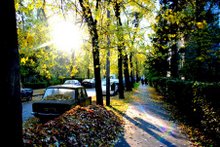

This week’s general impression was that I could not finish anything. I meandered, I wandered, I strayed, and I was not able to do anything with a lot of directed vision. This after-the-fact evaluation did not lessen my enjoyment.
Voyage voyaaaage, plus loiiiin que la nuit et le jour… voyage. Did you recognise the song? Villa-City was hard to leave because of the festival and general influx of Friday afternoon traffic of stressed Bucuresteni looking for peace. The taxi driver played elaborate word games with colleagues on the radio involving ‘pastrama de caini’ which I found hilarious. Leaving prematurely is not made easier by leaving in the evening, with the train, all clichés about train-sentimentality are, hehe, true. I love seeing settlements from the back, from the train perspective.
We passed so many construction sites I was reminded of the man doing tourist information in Villa-City who painted such a concise picture of the way in which present-day capitalism creates patchy development, because it is oriented towards growth too much. 500000 tourists per year in Sinaia, and a lot more in the valley at large, and with a land price ten times higher than in the village I work in. He was bright-eyed and fervently telling us about how some people managed to overcome every regulation to build their villa. His stories were underscored by accompanying, generous arm gestures and mimics adding to the rhetorical effect. I asked, somewhat fake-naively, how come? He made a grimace telling something like, come on girl, open your eyes, and said, you cannot imagine what kind of money some people have. How come? They just do, and they do what they want. Every person, he said, can be bought. He told us about the environmental pressures on the valley as blocks of flats were being built, about the pressure on the natural park to recede in favour of development, and I am still kind of curious about his own life story.
Stopover to see the almost-full moon over Kronstadt-la-belle, then I travelled back towards the village, via Bran and Rucar. I kept thinking of the therapeutic soothing value of looking at landscapes travelling past the bus window, and of chatting to fellow travellers about the apple harvest, nephews, and industry. I paid attention to how the fences change when you cross from Brasov into Arges this time, following Finnish Kati’s advice. The diamond-shapes slowly give way to elaborate ornamental, mostly round and flowery wrought iron motifs. The walnut trees were radiant with the greatest colour, golden-yellow, against the blue sky. The beeches were dipped in browner shades. All that is most beautiful before it dies. I was asking myself what makes the brightness of what is actually autumnal decay. When a pot plant dies, it is not really nice, just sad. Maybe it is the mass of the leaves and the puffiness of the forests seen from further away. But then again, the beauty does not disappear when you consider a single yellow leaf. I ask you scientists how it is that this process creates such bright colours (crimson, red, orange, light-bright-brown, yellow)? I came to the (hasty, probably) conclusion that it might be about the light, and thought of the implication of thinking the world not in terms of discrete things, but appreciating it in its wholeness, and this implies, in most cases, an issue of light. And the cool seasons of spring and autumn do display a special quality of light. But the issue is light itself. Ingold has said this a lot better than I could:
[t]he objects of vision, we suppose, are not sources or manifestations of light but the things that light illuminates for us. The objects of hearing, on the other hand, are not things but sounds or sources of sound. (Ingold 2000: 244)
This kind of ecological thinking
forbids us to conceive of vision as an operation of thought that would set up before the mind a picture or a representation of the world, a world of immanence and of ideality. Immersed in the visible by his body, itself visible, the see-er does not appropriate what he sees; he merely approaches it by looking, he opens himself to the world. And on its side, this world of which he is a part is not in itself, or matter. (Merleau-Ponty 1964: 162)
This is the porous subject that I am so intrigued by, still. It is what happens if you talk to someone, and you are really immersed in what they are saying. You intermingle not just with minds, but with personality (ok,ok,… used naively!) and individual being-in-the-world. Intersecting lifeworlds? I am such a Durkheimian in some ways, but I happen to think ‘intersubjectivity’ is not a good term to speak about what happens. ‘Inter’ does not describe the relationship. We need a more practical term.
References
Ingold, Tim (2000) The Perception of the Environment. London: Routledge.
Merleau-Ponty, Maurice (1964) The Primacy of Perception and other Essays on Phenomenological Psychology, the Philosophy of Art, History and Politics. J. M. Edie (ed) Evanston: Northwestern University Press.



















